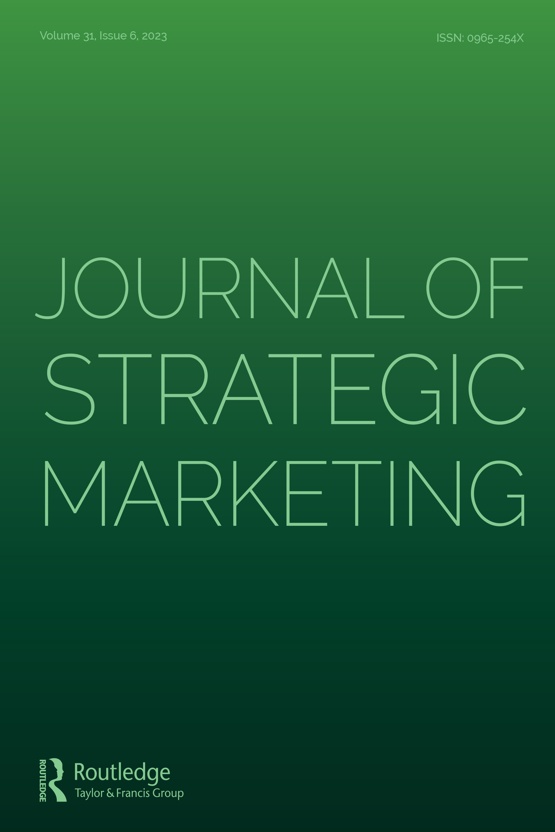Submit a Manuscript to the Journal
Journal of Strategic Marketing
For a Special Issue on
Marketing for Sustainable Food Consumption
Manuscript deadline
15 August 2024

Special Issue Editor(s)
Ninh Nguyen,
Graduate School of Business and Law, RMIT University, Australia
[email protected]
Mark Leenders,
Graduate School of Business and Law, RMIT University, Australia
[email protected]
Simon Pervan,
Graduate School of Business and Law, RMIT University, Australia
[email protected]
Carolyn Strong,
Cardiff Business School, Cardiff University, UK
[email protected]
Marketing for Sustainable Food Consumption
Food is a common thread linking all the 17 Sustainable Development Goals (SDGs) by the United Nations (Koehring, 2019); hence, a shift towards more sustainable food systems is essential for future sustainability. Whilst making food systems sustainable requires efforts from various stakeholders (e.g., producers, retailers, end-users and policymakers), consumers arguably play the central role. As an illustration, policies, strategies, and actions to promote sustainable diets can only be effective if consumers ultimately buy and consume sustainable food products (European Commission, 2023). Sustainable food consumption, therefore, lies at the heart of a sustainable food system.
Sustainable food consumption is often used interchangeably with sustainable diets (Mensah et al., 2023), which refer to the use of “those diets with low environmental impacts which contribute to food and nutrition security and to healthy life for present and future generations” (Burlingame & Dernili, 2012, p. 7). In this Special Issue of the Journal of Strategic Marketing, we take a holistic approach to sustainable food consumption, which encompasses increasing the consumption of healthy and sustainable diets (Burlingame & Dernili, 2012), reducing the use of harmful and unsustainable food products (Greenland et al., 2023), and cutting food waste (Reisch et al., 2013). Hence, in addition to SDG12 (Responsible Consumption and Production), sustainable food consumption can substantially contribute to a wide range of SDGs, including SDG1 (No Poverty), SGD2 (Zero Hunger), SGD3 (Good Health and Well-being), SDG13 (Climate Action), SDG14 (Life below Water), and SDG15 (Life on Land).
Prior research in sustainable food consumption has primarily focused on exploring the factors affecting the purchase and consumption of healthy and sustainable diets, such as plant-based, insect-based, and organic food products (Anusha Siddiqui et al., 2023; Pham et al., 2019). There is relatively limited evidence about the role played by marketing in encouraging sustainable food consumption. We do not know how marketers set sustainable food consumption goals and develop strategies to achieve their goals. Notably, marketers have been heavily criticised for selling and promoting unhealthy and unsustainable food products, creating negative social, health and environmental impacts. There have been recent calls for marketing to contribute to SDGs and sustainable consumption more proactively (Greenland et al., 2023; Voola et al., 2022).
This Special Issue holistically examines sustainable food consumption and highlights how marketing can shape and promote such consumption. We invite research papers that address issues pertaining to (but not limited to) the following topics:
- Marketing impact on the purchase and consumption of sustainable foods (e.g., plant-based, insect-based, functional, and organic products)
- Consumer behaviour towards sustainable foods and marketing implications
- Marketing actions for reducing food waste at the household and individual levels
- Marketing ethics and regulations for tackling unsustainable food consumption
- Food system stakeholders’ attitudes towards sustainable food consumption and production and implications for marketing and policies
- The role of retailers and in-store marketing in encouraging sustainable food consumption
- Effects of food labels and packages on sustainable food consumption
- Marketing communications for sustainable food consumption
- Digital and social media marketing for sustainable food consumption
- The role of emerging (marketing) technologies to create pathways to sustainable food consumption
- The role of Marketing in growing consumption of products using regenerative agriculture
- The role of communities in growing a more sustainable food system and consumption behaviours
- Partnerships in food supply chains for sustainable food consumption
Looking to Publish your Research?
Find out how to publish your research open access with Taylor & Francis Group.
Choose open accessSubmission Instructions
Contributors are invited to format their manuscripts based on the Journal’s guidelines provided on the Instructions for Authors webpage. Please note that a typical paper for the journal should be no more than 6,000 words. Contributors are required to select the Special Issue "Marketing for Sustainable Food Consumption" when submitting their paper.
All manuscripts will undergo a double-blind peer-review process, which starts immediately after the submission of a manuscript. In this respect, contributors are encouraged to submit at their earliest convenience.
Contributors are encouraged to send an abstract and discuss with the guest editors before submission. Inquiries should be directed to the corresponding editors: Dr Ninh Nguyen ([email protected]) and Prof Mark Leenders ([email protected]).